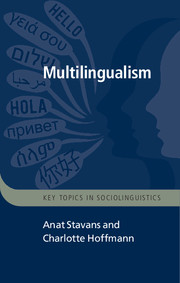Book contents
- Frontmatter
- Dedication
- Contents
- List of Figures and maps
- List of Tables
- Acknowledgements
- Introduction
- Part I Global and societal issues in multilingualism and trilingualism
- 1 Historical perspectives of language contact
- 2 Patterns of societal multilingualism
- 3 Old and new linguistic minorities
- 4 Globalisation, language spread and new multilingualisms
- Part II Construing individual multilingualism
- Glossary
- References
- Author index
- Places and languages index
- Subject index
3 - Old and new linguistic minorities
Published online by Cambridge University Press: 05 February 2015
- Frontmatter
- Dedication
- Contents
- List of Figures and maps
- List of Tables
- Acknowledgements
- Introduction
- Part I Global and societal issues in multilingualism and trilingualism
- 1 Historical perspectives of language contact
- 2 Patterns of societal multilingualism
- 3 Old and new linguistic minorities
- 4 Globalisation, language spread and new multilingualisms
- Part II Construing individual multilingualism
- Glossary
- References
- Author index
- Places and languages index
- Subject index
Summary
The limits of my language mean the limits of my world.
Ludwig WittgensteinIntroduction
The concept of a linguistic minority is relatively easy to define because language is its main qualifying feature. As is to be expected, no two linguistic minorities are the same, because social groups are shaped and affected by various sets of geographical, political, economic and sociocultural factors in diverse ways. Even though language is the main qualifying feature of a linguistic minority (as opposed to any other kind of minority) it needs to be remembered that among its members there may be speakers who are predominantly monolingual, in either the minority or the majority language, while others may be bilingual or trilingual depending on their linguistic experience, opportunities and needs. The title of this chapter requires some elaboration before we discuss issues related to linguistic minorities such as official recognition, language use and survival in the modern global age.
A broad distinction between linguistic minorities can be made in terms of age and origin so that some minorities are referred to as historic (or old), autochthonous, indigenous, native or aboriginal, while others are described as new, allochthonous or non-indigenous. Old minorities are those that have inhabited a place or region from earliest times (admittedly, a rather vague attribution), whereas new minorities are seen as ‘newcomers’ to a region. Obviously, labels such as ‘old’ and ‘new’ are subjective and need to be re-evaluated as time and terms of reference change. An immigrant community, such as the Bangladeshis in Britain or the Kurds in Sweden, is still considered a new minority even though some of their members are now third-generation immigrants. When will they cease being considered new? And when will they stop being labelled ‘immigrants’? These designations would certainly not be applied to members of the Amish community in the United States, whose forefathers arrived from Germany over two centuries ago, and probably not to those Hungarians in Canada who left their native country in the years immediately after the Second World War. Canada has seen more recent waves of large-scale immigration, for instance from Vietnam and China, who make up the new minorities now. In our exploration of linguistic minorities in multiple language contexts we are reminded of the inadequacies of certain descriptive labels as well as the diversity of multilingual contact situations within which they are found.
- Type
- Chapter
- Information
- Multilingualism , pp. 63 - 92Publisher: Cambridge University PressPrint publication year: 2015

